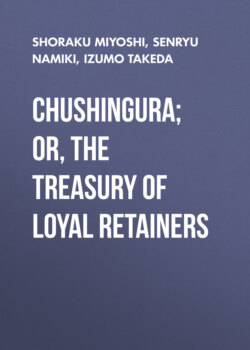Читать книгу Chushingura; Or, The Treasury of Loyal Retainers - Shoraku Miyoshi - Страница 5
На сайте Литреса книга снята с продажи.
THE PECULIARITIES OF THE JAPANESE LANGUAGE.
ОглавлениеTable of Contents
Language, the vehicle of thought as it is, conveys not unfrequently different impressions to different persons; especially is this the case when that language is not the hearer’s mother tongue. We may take in the general drift of what is said to us in a foreign tongue, but fail to understand the meaning which lies hidden beneath the surface. In reading a novel we may be unable to discriminate between a national characteristic and a personal idiosyncrasy; the rhythm and cadence of poetry may appeal to us in vain; and we may take too seriously humourous language and mistake the vulgar and coarse for the refined and elegant.
The Japanese language, which comes of a stock totally different to the Indo-European languages, has grown in a state of almost complete isolation, and in course of time, developed characteristics of its own. One of these is the abundance of vowel-sounds, for the consonants are almost invariably accompanied by vowels. Another is the frequency with which connective enclitics occur in a sentence. The Japanese is an agglutinative language, and the repetition of meaningless form-words naturally deprives the language of force and allows of little change in the order, of speech. Although there are other characteristics, the frequency of enclitics and form-words and abundance of vowels in individual words are the most important.
It is hardly necessary to dwell here upon the difficulty of translating a joruri, or semi-lyrical drama, like the Chushingura, especially as it abounds in word-plays. In the phonetic system of the Japanese language, which has a comparatively few consonantal sounds, such sounds being, as has already been stated, seldom unaccompanied by vowels, the variety of syllables is small and so, accordingly, is the number of their combinations, with the result that there is an abundance of homonymous words. The identity or similarity of sound is utilised to produce words that may be taken in more senses than one. Often, also, sentences that sound sweet and graceful are taken wholesale from literature of a former age and inserted so skilfully that one fails to detect any incongruity in the mosaic so formed; and yet, unless one is versed in the literature which has been drawn upon, it would be difficult to make out the drift of the passages in which they occur. These peculiarities are not, it is true, confined to joruri, for they may be found in all other works of lyrical nature; but they give a characteristic charm to joruri, and make it a very difficult task to translate a joruri into a European language. Thus, the eighth act of the Chushingura, which is made up of sentences and phrases of this description, fails to convey much meaning when translated into English.
